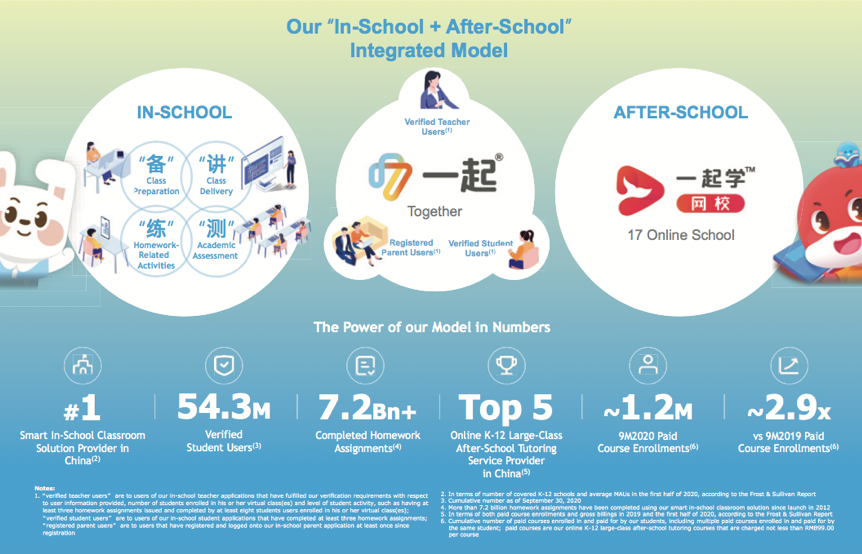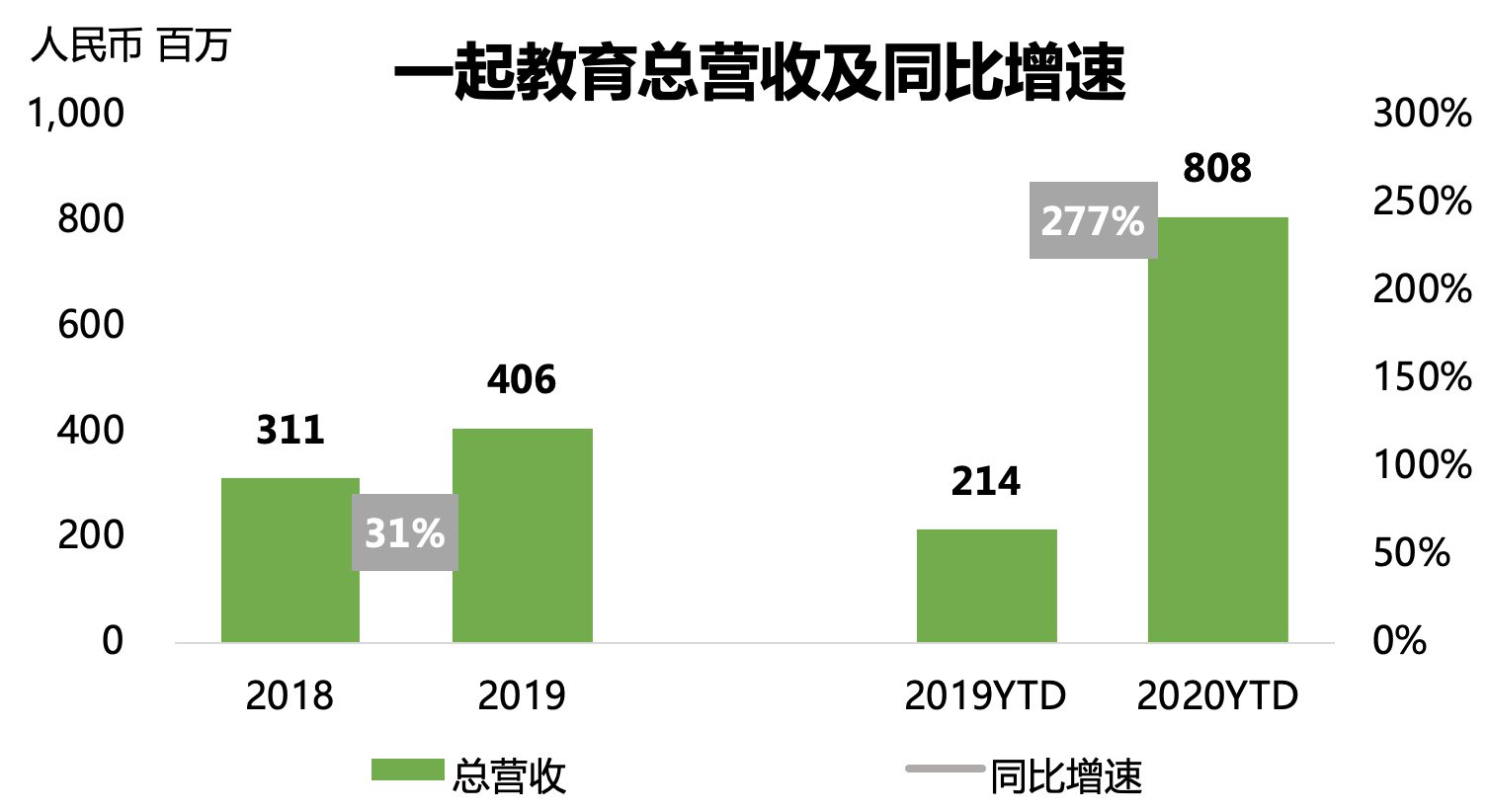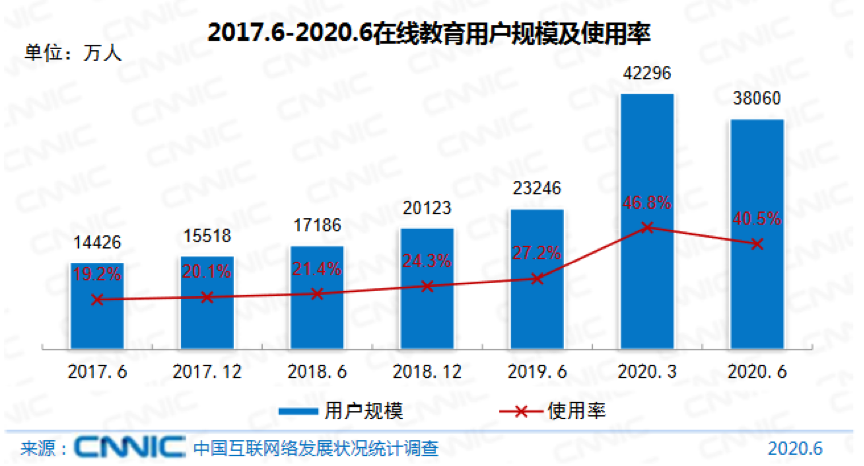The catalysis of the epidemic to the penetration rate of the online education industry is not a short-lived one. The change of user behavior and habits is an irreversible process. Online education has ushered in its spring.
In the early morning of November 14, 2020, Beijing time, Education and Technology formally submitted a prospectus to the US Securities Regulatory Commission (SEC), and successfully struck the bell on NASDAQ on December 4, with the stock code “YQ” , The issuance price is US$10.50 per ADS, and the closing price on the first day is US$10.57/share, with a market value of US$1.983 billion.
Through an initial public offering (IPO), Education and Technology raised a total of approximately US$330 million. The underwriters are Morgan Stanley, Goldman Sachs, Bank of America and China Renaissance Capital. The prospectus shows that the net proceeds will be mainly used for the improvement of extracurricular online education services, product enhancement of smart classroom education solutions, enhancement of technology research and development capabilities, sales and marketing activities, and for working capital and general corporate purposes .
Established in 2011, Yijie Education Technology is an intelligent education company that provides “Internet +” solutions. Its brand Yizhi has provided teaching, learning and evaluation applications to more than 900,000 teachers, 54.3 million students, and 45.2 million parents nationwide. Currently serving 70,000 schools nationwide, covering one-third of public primary and secondary schools nationwide.
Sullivan (Frost & Sullivan) report shows that the average MAU (Monthly Active User) in the first half of 2020 is the solution for smart classroom education. The first in the program area, the scale is larger than the sum of the following four companies.
Rapid growth, broad prospects
According to the prospectus, the net income of Yi Education Technology in 2019 was 406 million, a year-on-year increase of 30.75%. For the nine months ended September 30, 2020, the net income of Education Technology Technology was 808 million yuan, a year-on-year increase of 277.48%.
Data source: Yiyi Education Technology Technology (as of December 6, 2020) Note: YTD,D=Sept.30
As of November 26, 2020, the number of registrations for regular-priced courses of online K-12 extracurricular tutoring in Educational Technology reached 1.941 million during the year, which is about 2.8 times that of the same period in 2019; the cumulative number of registered paid courses reached 773,000, 2019 The same period of the year was 286,000. Overall, the company is in a period of rapid growth.
CNNIC data shows that in March 2020 during the epidemic, the number of domestic online education users reached 420 million, accounting for 46.8% of the number of Chinese Internet users. By June, when the epidemic was basically under control, there were still 380 million, accounting for 40.5%. Compared with 27.2% in June last year, the penetration rate of the online education industry has increased significantly.
This means that the catalysis of the penetration rate of the online education industry by the epidemic is not a flash in the pan. The change of user behavior and habits is an irreversible process, and online education has ushered in its spring.
Although the epidemic has greatly increased the penetration rate of online education (40.5%), compared with the penetration rate of online video (94.5%), online payment (86.0%), and online shopping (79.7%), online There is still enough room for growth in education, which means that the educational technology that is rushing to the market will still have a lot to do in the future development process, and the prospects are broad.
Thousands of sails compete for development, how can education and technology break through together?
Although there are many players in the online education industry, their respective fields and focuses are different. But no matter which model it is, the online education of education is inseparable from the advancement and application of technology.
This determination to solve problems with technology is also reflected in the company’s financial expenditures. The data published in the prospectus shows that the research and development expenses of education technology have always maintained a relatively high growth. In 2019, R&D expenses reached 491 million yuan, an increase of 23% year-on-year. In the first three quarters of 2020, the R&D investment in education technology reached 423 million yuan, an increase of 17% year-on-year, accounting for 52% of revenue.
In addition, Yiyi Education Technology is also actively exploring the use of artificial intelligence and big data technologyCombining technology with online education, Liu Chang said in a previous interview that the realization of intelligent education requires three steps-data accumulation, label classification and precise distribution. At present, the data accumulation of education technology technology is mainly divided into three layers: content layer, user attribute layer and user behavior layer. Among them, the content level (Content Level) contains tags such as knowledge points, ability, difficulty, etc., which is equivalent to constructing a dependency relationship between each tag, and aggregated into a knowledge graph; User Profiling Level mainly contains the attributes of users Data, such as the ID’s region, school, teaching materials, and user portrait tags; User Behavior Level refers to the behavior data formed by the daily use of users, such as topics used by users in the same region. The common data after this layer of data will be accumulated Will be used for deep learning and data mining.
It can be said that after a long period of accumulation, education, technology and technology have unparalleled advantages in the breadth and depth of data. The optimism of Zhene Fund, Shunwei Capital, Temasek, CITIC Industry Fund and other well-known investment institutions is also optimistic about the education technology technology.
It is reported that after the IPO, the company’s chairman and CEO Liu Chang holds 15.5% and 81.7% of the voting rights; Shunwei Capital holds 17% and 3.7% of the voting rights; H Capital holds 10.3% and has With 2.2% of the voting rights, CL Lion Investment III Limited holds 9.8% of the shares and has 2.1% of the voting rights.
To this day, we can be sure that the popularity of online education has not passed, and the industry still has ample room for growth. With its unique positioning and strong technical strength, the successful breakthrough of educational technology may be in the near future.


